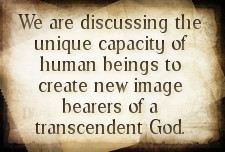To Have or Not Have: Childlessness and Imago Dei Identity

This past week I found myself cuddling the newest member of our church—a sweet, Dreft-scented little girl named Hope. As I held her in my arms, I have to admit that I felt the ache of maternal longing well up inside me. The memories of my own children at that age and the sheer wonder at new life were almost too much. And yet, my husband and I are not presently pursuing any new members of the family. For us, as it is for many couples, the question of when and whether to have more children has been a complicated one, one that has forced us to wrestle through desire, calling, and limitation. On the other hand, for an increasing number, the question is not when or how many children to have; the question is whether to have them at all.
In August, Time magazine explored this phenomenon in their cover story entitled, “The Childfree Life: When having it all means not having children.” And then earlier in September, Emily Timbol wrote a piece for Her.meneutics, a blog of Christianity Today, explaining why she and her husband do not intend to have children (and why she’d appreciate you not judging her for it). Now, couples choosing to not have children is nothing new; but what I do find interesting is why they are choosing this. The current argument seems less rooted in the classic appeal to overpopulation or the desire to commit oneself to extreme callings or even a worry about bringing children into a terribly broken world. Instead, it seems that more and more couples are choosing to not have children in order to pursue certain lifestyles and careers unhindered. And while it’s easy to chalk this up to Millennial selfishness, (see here for a piece that rightly challenges the temptation to make Millennials the scapegoat for every societal ill), I don’t think it’s that simple. At the same time, the question of whether to have children is going to be increasingly pesky one for Millennials for a couple of reasons:

Discussion